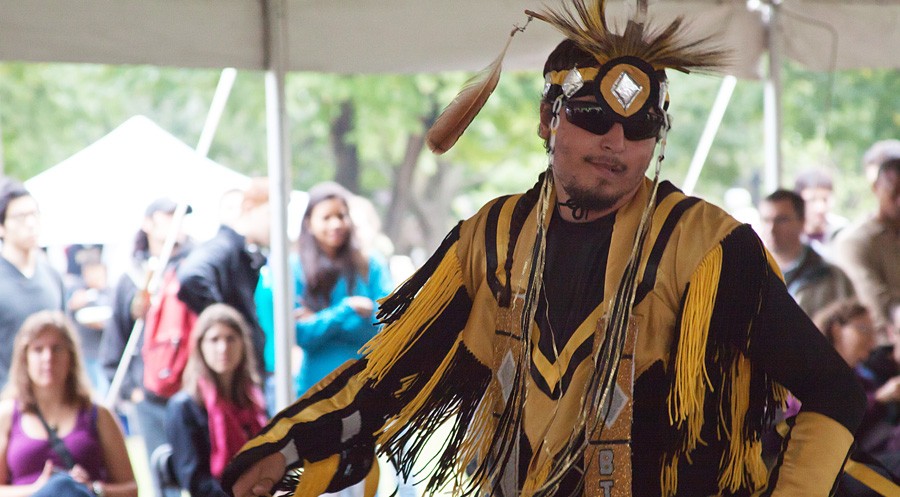On Sept. 21, McGill’s First People’s House held their 11th annual Pow Wow on Lower Field. With traditional singing and dances, this year’s Pow Wow included a variety of cultural activities to engage students and raise awareness about Aboriginal cultures.
Catching the attention of many passing students, the Pow Wow started off in high spirit, and was an auspicious start to the upcoming Aboriginal Awareness Week, running from Sept. 24 to 28.
“Every year, Pow Wow is getting bigger and better,” Paige Isaac, interim coordinator of McGill’s First People’s House and one of the key organizers of the event, said. “[This year], we did a better job at planning, promotion, and finding new artists… The head dancer, Chris Wysote, actually drove all the way from my community [Listuguj Mi’gmag] just for this event.”
The intermittent rain did little to dampen the excitement afforded by numerous scheduled programs such as Inter-Tribal Dances, Inuit Throat Singing, and Round Dance. Aided by loud speakers, the drumbeats echoed across campus and drew an increasingly large crowd as the event progressed. At the centre of the event, the Aboriginal performers from various North American reserves danced complex steps, wearing patchwork dresses with feathered garments.
The word ‘Pow Wow’ is derived from the Narragansett word ‘powwaw,’ meaning ‘spiritual leader.’ Originally a gathering of North American Aboriginals, it has evolved in recent decades into an event promoting interactions between Aboriginal and non-Aborginal people. Through dances, songs, and speeches, participants were not only exposed to Aboriginal culture, but also encouraged to socialize without the constraints of social barriers and stereotypes.
This year’s Pow Wow sought to pursue such goals with interactive performances such as the Round Dance. In this dance, audience members are encouraged to join hands with performers and dance in circles. Rather than observing from afar, students participated hand in hand with first nations dancers.

In addition, Pow Wow organized a special workshop to introduce students to a contemporary Aboriginal DJ group, “A Tribe Called Red.” The artists in the group—DJ NDN, DJ Shrub, and Bear Witness—combine traditional drumbeats and throat singing from Cree culture with modern rhythm and melody. The result is a unique style of club music that bridges traditional music with hip-hop, electronica, and house music.
“Traditional Cree drumbeats generally try to get people to dance as wild [sic] as they can, so in a way, it’s perfect for remixing with music today,” DJ NDN said during a question and answer period. “Our process in making music is in many ways trial and error…We synthesize different tones and beats, and keep editing them until they’re ready.”
DJ NDN also emphasized the importance of social media in helping to promote their music.
“The feedback has been very positive,” he said. “We haven’t gotten any bad stereotypes or negative comments on our native influence.”
Outside the workshop, vendors sold a variety of hand-made crafts, accessories, and clothing. Each item had unique patterns, and passing students were intrigued by their creative design and Aboriginal significance.
In an interview with the Tribune, Isaac expressed excitement for the upcoming Aboriginal Awareness Week.
“Everything went according to plan in this year’s Pow Wow,” she said. “We were very happy with the results.”
Pow Wow volunteer Brennan Gordon, U2 arts, said that he’d seen several students volunteering at the event.
“Pow Wow’s been fun,” Gordon said. “This is my first time volunteering [but] I think this helps McGill students find out more about indigenous culture.”









